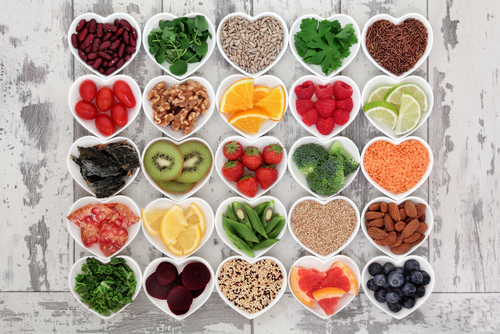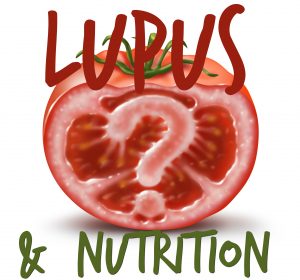Lupus and Proper Nutrition

It is no secret that food is one our most basic needs. It provides the building blocks for strong and healthy bodies. People with lupus have the same requirements as everyone else, except we are a little more sensitive to the effects of food. Food for a lupus warrior can be a trigger — even foods thought to be healthy can create issues for someone battling this disease. For example, our bodies are on hyperdrive when it comes to our immune system, so we are often on immunosuppressants to keep our immune systems from constantly being in hyperdrive. While most people take a little garlic in their food for granted and others realize that it has some great health benefits, for a lupus patient, it’s something we need to avoid. Why? Garlic is an immune booster, and to give an immune system that is in hyperdrive a booster is tantamount to giving a 3-year-old chocolate cake just before bedtime. In my opinion, nothing good can come from that.
When I first started feeling less than myself, I started keeping a highly detailed food diary. I recommend this to everyone who is battling any form of autoimmune issue, because it certainly can’t hurt to learn what works with your body and what works against it. Please keep in mind that what I share here is my own personal experience: some people can eat things with no issues while others cannot, just like in the general population. But again, those of us battling autoimmune issues are a bit more sensitive.
I really started paying strict attention to the actual ingredients in my foods, not just what was on the front of the box —gluten free, sugar free (thinking that was healthier), and high in fiber. What I have learned by just whipping out my smartphone has been downright scary. I became a little paranoid about the aisles in the grocery stores and that paranoia has paid off.
The vast majority of the foods I eat (I do occasionally fall off the wagon, and trust me, suffer for it) are organic and real. I have had so many people say to me that to eat this way is costly. I have shown time and again that it is not as long as you stay out of chain grocery stores and shop at local farmers’ markets. I have managed to find a farmers’ market that had an honor system for its buyers. It even had a sign that said, if you are hungry and can’t afford to buy, please still get good food. I have found a farmers’ market that is over 100 years old, and a “no pesticide” market that not only takes EBT cards (they have a $5 box that you can fill up of fresh fruits and vegetables that are going to go bad soo). These are items you can take home and freeze.
A little digging in your own community will, I am certain, yield some wonderful treasures. A little research goes a long way when it comes down to these diseases. I can tell you that while getting good, real food can be helpful, not knowing how the foods affect you can still leave you in pain. Many don’t realize that just because something is natural does not automatically make it great for you, as in the example of garlic. There are natural foods that naturally cause inflammation (see nightshades) so again, some people can eat them (no tomatoes or potatoes for me, but I can eat peppers). A food diary really helped me figure this out.
I highly recommend staying on the edges of your local grocery store, and if there is anything that is in a package that you must buy, be diligent about what the actual ingredients are. I have learned that much of what we eat is genetically modified, and this is not something I am personally interested in consuming. Many of the side effects are known to create problems in lab animals and have not been extensively tested for human consumption. I am learning how to garden (in containers, because I’m a chicken when it comes to the bugs) and finding that cooking at home is not as inconvenient as I’d once convinced myself that it was. I have also discovered new flavors and a new enjoyment because of testing new recipes. Five months ago, I could not walk and talk at the same time; now I have more energy than I thought possible. I attribute that to the changes in the way I eat.
Recently, on a visit to my son’s home, I admittedly felt like I was imposing by wanting to take over his kitchen, load his fridge with my special foods and such, so I ate what would be considered “convenient.” Store-bought, quick-processed foods, and my body was in severe pain because of this error in judgement. I tend to do my best to stay away from opiate painkillers, but this was unavoidable after a few days of jarred spaghetti sauce, boxed cereal and one particularly painful morning of gourmet coffee & a blueberry muffin from a local coffee spot (no, it was not Starbucks). The lesson I learned was inspiration for this post. Eat. Good. Food. For those that would say this is costly or inconvenient, trust me when I tell you that medical bills are more expensive than grocery bills, and multiple trips to the hospital will muck up your schedule a lot more than making a meal at home.
I am a big proponent for eating the best foods you can find that are naturally grown, and with as few pesticides as possible (some organic farmers do use pesticides). Ask questions (they’ll tell you what they use) and do your own research. Smartphones have put a serious wealth of information right at your fingertips. I often move out of the main spots of the grocery aisles with a product, reviewing its ingredients. If you are interested in a great app, please check out Fooducate — it allows you to scan in the barcode of the item, and then it gives you all the nutritional information on what you are shopping for. I like it because it’s fast, grades the foods, and offers you better alternatives if the food item you have selected is rated poorly.
I hope this helps you on your journey to get well and stay as healthy as possible.
Note: Lupus News Today is strictly a news and information website about the disease. It does not provide medical advice, diagnosis, or treatment. This content is not intended to be a substitute for professional medical advice, diagnosis, or treatment. Always seek the advice of your physician or other qualified health provider with any questions you may have regarding a medical condition. Never disregard professional medical advice or delay in seeking it because of something you have read on this website. The opinions expressed in this column are not those of Lupus News Today, or its parent company, Bionews Services, and are intended to spark discussion about issues pertaining to lupus.








Anna
Really interesting article! I know this disease from a friend of mine. As far as I know she started keeping a food diary like you. It was exhausting! For now she is using the YAZIO app, that makes everything easier. It gave her a feeling for the actual ingredients in her food.
Again, good thoughts! Thank you for sharing, I`ll send it to my friend.
Kellie McRae
Hi Anna, Thank you for sharing! I will have to check that app out, I really try my best now to cook as fresh as possible, farm fresh veggies and fruits. The best ingredients are from the earth :-) I wish your friend health and blessings, thanks for stopping by.
Jill Blackstone
You made a lot of good points but the most important point for me -- and something I struggle with constantly -- is maintaining a healthy diet at home but then feeling you are inconveniencing others when you go to their homes or want to choose a restaurant for a (rare) social outing. They just. Don't. Get. It. I do my best to adhere to clean living overall, and one time I went HARD CORE with this. We got rid of all chemical-based cleaners and used vinegar for 80% of things and a few natural cleaners for other things. We added essential oils to baking soda to scent the home or closets. Lots of things that are easy and inexpensive. We started growing simple vegetables in pots and herbs herbs herbs because that will make the difference in your food and drinks for sure. I struggle to drink enough water, never really liked water (!) but add some fresh mint and lemon and cucumber and I can't get enough. And when I embraced this clean living / eating, I never felt better since my lupus diagnosis. But circumstances changed, I no longer own my own home, and my housemate does not care at all about eating processed foods. So we struggle to find room for two entirely different diets, and trying to explain how bad those other foods can make you feel seems impossible. Also, your point about asking vendors is totally true. I email companies and they are almost always happy to chat about their product. I use a site called Labdoor to find the best supplements, vitamins, etc. When I had to stop being a vegetarian after 27 years because I was so anemic, I went to Whole Foods and talked to the manager of the meat department. I was kind of skeeved at the time but had to do it. He happily gave me the names and numbers of their vendors, and I called them. The people were impressed by my interest in their product and I had serious questions -- what did the animal eat, how did it live, and yes how did it die. It matters. Labels are deceiving. I now know to eat only grass-fed dairy and ONE HUNDRED PERCENT grass-fed beef (on occasion). Anyone can give a cow grass for a week and label it, but nature says the cow should eat grass year-round, forever. When an animal is stressed before slaughter, it releases hormones which are then in what you eat. There are humane ways to slaughter animals, and whatever your choice, make informed choices. (ps there is no humane way to slaughter a pig, and they are intelligent beings, so no pork for me ever). Also MSG is everywhere. Stalk it and you will find it. But what we eat is our fuel, and whether you're a spoonie or a draned battery metaphor, we all need the best fuel we can get into our beleaguered bodies.
Kellie McRae
Hi Jill, you also make a lot of good points on asking companies about what they feed an animal and for sure how they slaughter it. I am not a fan of pork because pigs don't sweat which means there are a lot of toxins even if they did it humanely. I wish you had a housemate that was as diligent as you have been, its good for us all to eat well. Can you perhaps do a potted garden since you no longer own your home? I have a balcony at my apartment here in Thailand and I have potted plants. I know warriors who will eat at home before a social event, one woman told me she won't even drink the tea, it's solely water for her. This could be a pain in the behind, I am quite fortunate that where I live, being a vegetarian is a high honor and you can find a great place to eat on almost every corner. It's hard trying to eat good stuff in a world filled with junky food. Too bad processed food isn't all it's cracked up to be because some of it is quite tasty but the after effects are just not worth it.
Jill Blackstone
Good for you for living in a vegetarian-friendly climate. I was a vegetarian for decades but when I was unexplainably critically anemic (hello? lupus diagnosis?) I was ordered to go back to animal protein. So when people here oh Jill eats meat again, they throw some burgers on the grill or whatever. My housemate struggles with SO many nutritional problems, and when I took over food shopping and prep and admitted that she felt a lot better. But she also smokes and drinks soda (regular and diet) without regard to what that does to blood sugar, and eats a pint of ice cream watching TV without though. So we sort of agree to disagree. Right now I am visiting my parents and they try so at least the eye rolling has stopped. People think I'm nuts to call ranchers and ask how the animals were slaughtered but it is as important as the rest of it. Thanks for the support.
Kellie McRae
The one thing I have learned through this journey is people will do the things that they find truly important. What others think can't sidetrack us towards getting what we feel is necessary for our well-being. When others try to convince me that meat is good for me, I remind them that meat is good for THEM, they don't get to choose what I eat regardless of their opinions. Every one of us is different, I'm a little anemic but that was the case while I was eating meat and that hasn't changed for me after the elimination of it. I was told to eat animal protein because I wanted to gain weight, it worked but I felt terrible. So, I have opted to remain the boney girl who feels better. I hope you get all YOU need, if your housemate benefits, that's awesome and those that want to eyeroll, that's their prerogative but do what you must for you because this lupus is no joke, if you can find ways to feel better, I am on board :-)